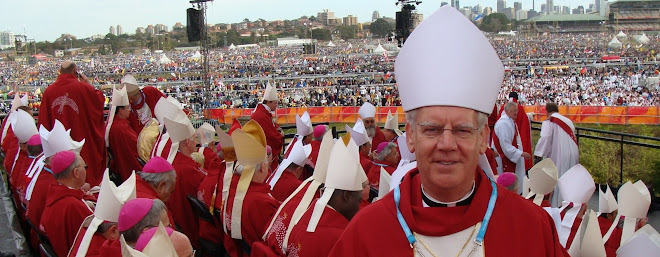 Campion has a lovely chapel with colourful and bright art work which helps us remember that Jesus' gift to us is life, and indeed life to the full.
Campion has a lovely chapel with colourful and bright art work which helps us remember that Jesus' gift to us is life, and indeed life to the full. Fr. Ben Fiore, SJ concelebrated the Mass with me. Fr. Ben is the President of Campion. He has authored a commentary on The Pastoral Epistles, published in the Scripture Commentary "Sacra Pagina" among other things.
Fr. Ben Fiore, SJ concelebrated the Mass with me. Fr. Ben is the President of Campion. He has authored a commentary on The Pastoral Epistles, published in the Scripture Commentary "Sacra Pagina" among other things.
Following the Mass we had a pizza lunch together and talked about some of the concerns and questions the students had about the Church and Catholic life. Here's some pictures of the group gathered that day.
 We were joined by Sr. ReAnne Letourneau, a Sister of the Presentation of Mary. The Sisters have a house in Regina which offers some accommodations to women studying at the University.
We were joined by Sr. ReAnne Letourneau, a Sister of the Presentation of Mary. The Sisters have a house in Regina which offers some accommodations to women studying at the University.
On the left in this picture is Stephanie Malloy who is Campus Minister at Campion.

Some of the conversation centered on the Eucharist and the attraction of the "Latin Mass" to some young people. The reference is to the Missal of John XXIII published in 1962. The Holy Father, Pope Benedict XVI has granted permission to celebrate the Eucharist according to this Missal as an "extraordinary expression of the Law of Prayer of the Roman Rite of the Catholic Church."
The normal expression of the Law of Prayer today is the Missal of Paul VI, approved in 1970 following upon the desire expressed by the Second Vatican Council that "the respectful reverence due to divine worship should be renewed and adapted to the needs of our time."
It may be good for us to recall the words of this Ecumenical Council of the Church that lie at the base of the liturgic reforms promulgated by the Church in recent decades. We read in the Constitution on the Sacred Liturgy, Paragraph 50:
The rite of the Mass is to be revised in such a way that the intrinsic nature and purpose of its several parts, as also the connection between them, may be more clearly manifested, and that devout and active participation by the faithful may be more easily achieved.
For this purpose the rites are to be simplified, due care being taken to preserve their substance; elements which, with the passage of time, came to be duplicated, or were added with but little advantage, are now to be discarded; other elements which have suffered injury through accidents of history are now to be restored to the vigor which they had in the days of the holy Fathers, as may seem useful or necessary.
The Church, therefore, earnestly desires that Christ's faithful, when present at this mystery of faith, should not be there as strangers or silent spectators; on the contrary, through a good understanding of the rites and prayers they should take part in the sacred action conscious of what they are doing, with devotion and full collaboration.
We also talked about the attraction of what young people see as "new" or "different" ways of celebrating the Liturgy which these older rites seem to provide. However union with Christ in the Liturgy, and experience of the mystery of God comes to us, like all important relationships in life, by constant effort.
We also talked about the attraction of what young people see as "new" or "different" ways of celebrating the Liturgy which these older rites seem to provide. However union with Christ in the Liturgy, and experience of the mystery of God comes to us, like all important relationships in life, by constant effort.
I will finish of this post with some words of our Holy Father, Pope Benedict, on the important question of "active participation" in the Liturgy. They bring out this need of continually developing our relationship with our Risen Lord. This exerpt is taken from his document "Sacramentum Caritatis" (The Sacrament of Love") and speaks of the conditions required for truly fruitful participation in the Liturgy:
One of these is certainly the spirit of constant conversion which must mark the lives of all the faithful. Active participation in the eucharistic liturgy can hardly be expected if one approaches it superficially, without an examination of his or her life. This inner disposition can be fostered, for example, by recollection and silence for at least a few moments before the beginning of the liturgy, by fasting and, when necessary, by sacramental confession. A heart reconciled to God makes genuine participation possible. The faithful need to be reminded that there can be no actuosa participatio in the sacred mysteries without an accompanying effort to participate actively in the life of the Church as a whole, including a missionary commitment to bring Christ's love into the life of society. (55)
My thanks to these young university students for sharing their thoughts and insights. I look forward to more of these occassions.
-30-


No comments:
Post a Comment